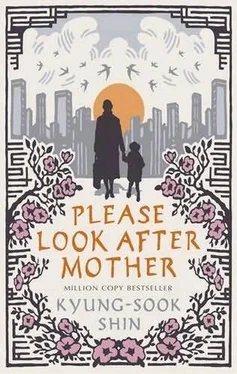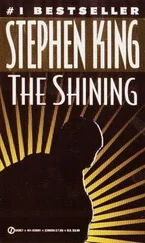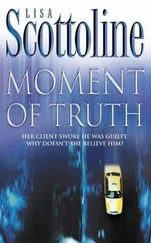“Didn’t you even bother to sleep on your mat?” Your sister’s eyes, which used to be unfaltering and fierce when she was a young, childless widow, now look tired. Her hair, brushed neatly and secured with a hairpin, is completely white. She’s eight years older than you, but her posture is straighter. She sits next to you, pulls out a cigarette, and puts it between her lips.
“Didn’t you quit smoking?” you ask.
Without answering, your sister uses a lighter printed with the name of a bar in town and puffs on her cigarette. “The dog is at my house. You can bring it back if you want.”
“Leave it there for now. I think I need to go back to Seoul.”
“What are you going to do there?”
You don’t reply.
“Why did you come back by yourself? You should have found her and brought her back!”
“I thought she might be waiting here.”
“If she was, I would call you right away, wouldn’t I?”
You’re silent.
“How can you be like this, you useless human being! How can a husband lose his wife! How could you come back here like this, when that poor woman is out there somewhere?”
You gaze at your white-haired sister. You’ve never heard her talk about your wife in this way. Your sister always clucked her tongue disapprovingly at your wife. She nagged your wife for not getting pregnant till two years after your wedding, but when your wife had Hyong-chol, your sister was dismissive, saying, “It’s not like she’s done something nobody’s ever done before.” She lived with your family during the years when your wife had to pound grain in the wooden mortar for every meal, and she never once took over the mortar. But, then again, she helped take care of your wife after she gave birth.
“I wanted to tell her some things before I died. But who am I going to tell, since she’s not here?” your sister says.
“What were you going to say?”
“It’s not just one or two things…”
“Are you talking about how mean you were to her?”
“Did she tell you I was mean to her?”
You just look at your sister, not even laughing. Are you saying you weren’t? Everyone knew that your sister acted more like your wife’s mother-in-law than her sister-in-law. Everyone thought so. Your sister hated hearing that. She would say that was how it had to be, since there was no elder in the family. And that might have been the case.
Your sister slips out another cigarette from her cigarette case and slides it in her mouth. You light it for her. Your wife’s disappearance must have pushed your sister to take up smoking again. It was hard for you to think of your sister without a cigarette in her mouth. The first thing she did when she woke up every morning was to feel around for a cigarette, and all day long she looked for cigarettes before she did anything, before she had to go somewhere, before she ate, before she went to bed. You thought she smoked too much, but you never told her to quit. Actually, you couldn’t tell her. When you saw her right after her husband died in the fire, she was staring at the house that had burned down, smoking. She was sitting there, smoking one cigarette after another, neither crying nor laughing. She smoked instead of eating or sleeping. Three months after the fire, you could smell cigarettes on her before you went near her, the tobacco seeped into her fingers.
“I won’t live long now,” your sister has said since the day she turned fifty. “All these years, I thought my lot in life was especially… especially harsh and sad. What do I have? No child, nothing. When our brothers were dying, I thought I should have died instead of them; but after our parents died, I could see you and Kyun, even though I was in shock. It seemed we were alone in the world. And then, since my husband died in the fire before I had a chance to grow fond of him… you’re not only my brother, you’re also my child. My child and my love…”
That would have been true.
Otherwise, when you were bedridden, half paralyzed from a stroke in your middle age, she couldn’t have wandered the fields to harvest dew for a year, through spring, summer, fall, having heard that you would be cured if you drank a bowlful of dawn dew every day. To get a bowl of dew before the sun rose, your sister woke up in the middle of the night and waited for the day to break. Around that time, your wife stopped complaining about your sister and started treating her with respect, as if she were indeed her mother-in-law. Your wife, with an awed look on her face, would say, “I don’t think I could do that much for you!”
“I wanted to say to her that I was sorry about three things before I died,” your sister continues.
“What did you want to say?”
“That I was sorry about Kyun… and about the time I screamed at her for chopping down the apricot tree… and about not getting her medicine when she had stomach problems…”
Kyun. You don’t reply.
Your sister gets up and points at the tray covered with the white cloth. “There’s some food for you; eat it when you’re hungry. Do you want it now?”
“No, I’m not hungry yet. I’ve just woken up.” You stand, too.
You follow your sister as she walks around your house. Without your wife’s caring hands, the place is covered in dust. Your sister wipes the dust off the jar lids as she walks by the back yard.
“Do you think Kyun went to heaven?” she asks suddenly.
“Why are you talking about him?”
“Kyun must be looking for her, too. I see him in my dreams all of a sudden. I wonder how he would have turned out if he’d lived.”
“What do you mean, how he would have turned out? He’d be old, like you and me…”
When your seventeen-year-old wife married twenty-year-old you, your little brother Kyun was in the sixth grade. A smart child, he stood out among his peers: he was sharp and outgoing and handsome and got good grades. When people passed Kyun, they turned around to take another look, wondering which lucky family had him as a son. But he couldn’t go on to middle school because of your financial straits, although he begged you and your sister to let him go. You can almost hear it now: Please send me to school, brother; please send me to school, sister . He cried up a storm every day, asking you two to send him to school. Even though a few years had passed since the war, it was pitiable-you were unbelievably poor. Sometimes you think of those days as if they were a dream. You survived miraculously after being stabbed in the neck with a bamboo spear, but you were mired in a desperate situation as the eldest son of the extended family, responsible for feeding everyone. That might have been why you wanted to leave this house, because it was so difficult. It was difficult to find food, let alone send your brother to school. When you and your sister didn’t listen to him, Kyun begged your wife.
“Sister-in-law, please send me to school. Please let me go to middle school. I’ll spend my whole life making it up to you.”
Your wife said to you, “Since he wants it so badly, shouldn’t we send him to school somehow?”
“I couldn’t go to school, either! At least he was able to go to elementary school,” you retorted.
You couldn’t go to school because of your father. As a doctor of Chinese medicine, he wouldn’t let you go anywhere there were a lot of people, whether school or anyplace else, after he lost his two older sons to an epidemic. Your father, sitting knee to knee with you, taught you Chinese characters himself.
“Let’s send him to school,” your wife said.
“How?”
“We can sell the garden.”
When your sister heard that, she said, “You’re going to be the ruin of this family!” and she sent your wife to her hometown. Ten days later, drunk, your feet headed toward your in-laws’ at night. You stumbled along the mountain path, and when you got to your in-laws’ cottage, you stopped near the glowing window of the back room, the one closest to the bamboos. You didn’t go there thinking you would bring your wife back. It was the rice wine that had brought you there, the makgoli you had been given after you helped a neighbor plow his fields. Even though you weren’t the one who had sent your wife back to her childhood home, you couldn’t step into your in-laws’ house as if nothing had happened, so you just stood there, leaning against the dirt wall. You could hear your mother-in-law and your wife talking, just as you had in the cotton fields a short time ago. Your mother-in-law raised her voice and said, “Don’t go back to that damn house! Just pack up your things and leave that family.”
Читать дальше











